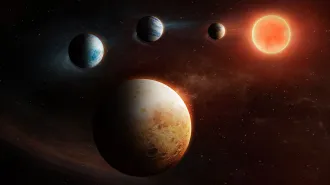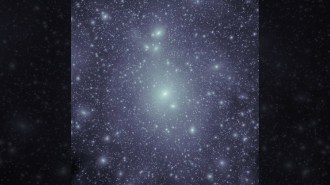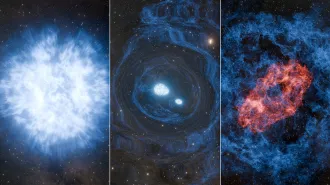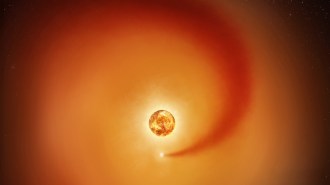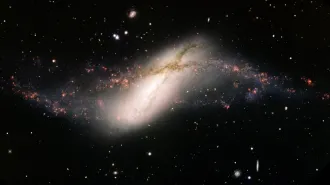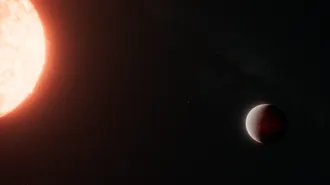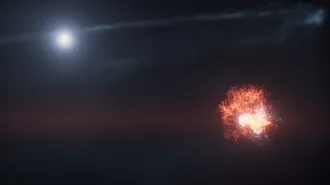Mark Whittle’s new CD isn’t likely to win a Grammy, but it’s got a primal beat. Beginning with a scream and ending in a deafening hiss, the sound track reflects what he and many other astronomers suspect the universe sounded like immediately following the Big Bang and for some 100 million years thereafter. The entire cosmic symphony, Whittle notes, is the prelude to a remarkable transformation that continues to unfold nearly 14 billion years later: the evolution of the universe from a smooth, hot broth to a lumpy, cold stew of stars, galaxies, and galaxy clusters.

The tones on the CD are oscillations of radiation let loose at the cosmos’ beginning that are still reaching Earth. The highest-pitch tones helped create the cosmos’ first glimmers of starlight, while the deepest notes are waves that triggered the formation of the galaxies that now fill the universe, says Whittle, an astronomer at the University of Virginia in Charlottesville.
Because the primeval oscillations unfold at about one cycle every 50,000 years, they’re equivalent to the notes 50 octaves below the lowest piano key. That’s not sound as humans know it, so Whittle shifted the entire cosmic production up into the audible range.
Premiering the recording in June at a meeting of the American Astronomical Society in Denver, Whittle shocked a staid audience with his rock concert–loud cosmic rendition. The deep tones and high wails spilled over into to the next lecture hall, where a crowd listening to a talk on the marvels of the new Spitzer Space Telescope was unexpectedly treated to a riff representing the birth pangs of the universe. Whittle has posted the recording on his Web site (http://www.astro.virginia.edu/~dmw8f/).
“I thought it was so cool,” says cosmologist Andrew Hamilton of the University of Colorado in Boulder, who listened to the sounds later in the meeting. “I was hoping for years that someone would do this—make a recording of the sounds of the [early universe], rather than just visualize the Big Bang in a graph.”
First sounds
The recording doesn’t break new ground in cosmology, but it could serve as an audio introduction for anyone curious about how the first stars and galaxies formed, Whittle asserts. “The early universe is so remote and so different that it can be very difficult to bring it to life in peoples’ minds,” he says. Although telescopes have taken snapshots of the early universe, the recording offers another way of accessing that distant time. “To fully appreciate the Garden of Eden, one mustn’t only gaze upon the tree’s luscious apple but also listen to the snake’s hypnotic hiss,” he says.
The sounds are not a smoothed-over artistic rendition, he adds, but a reproduction of the cacophonous process that presumably characterized the birth of the universe. Says Whittle: “You hear much of the core physics.”
Given the richness of that physics, “the only disappointing thing is that it sounds more like a scream than a Mozart symphony,” adds Hamilton.
To make the recording, Whittle relied on publicly available computer models of the early universe and tapped into the data collected over the past decade by numerous telescopes that have captured the faint glow that bathes the cosmos. That glow, known as the cosmic microwave background, is the radiation left over from the Big Bang. The radiation has now cooled to microwave energies equivalent to just a couple of degrees above absolute zero.
Whittle’s specialty is not the sounds of the infant universe but rather the study of galaxies that house supermassive black holes. He began the cosmic-symphony project 18 months ago, when he was asked to give a public lecture on new findings from the Wilkinson Microwave Anisotropy Probe, a NASA satellite that cosmologists have used to determine the age of the universe and the time when the first stars started to shine (SN: 2/15/03, p. 99: Cosmic Revelations: Satellite homes in on the infant universe). Whittle turned to sound waves because he saw a connection between acoustics and the radiation left over from the early universe.
The link comes about because the seemingly uniform glow of the microwave background is actually slightly patchy, varying in brightness by as much as 0.01 percent from one spot to the next across the sky. These variations, caused by tiny differences in density, temperature, and pressure from place to place, reveal the seeds of the entire cosmic tapestry present today: clusters of galaxies strung along filaments and the gargantuan voids between them. Some of the primordial patchiness is acoustic because it represents pressure waves traveling through the thin, hot soup of the early universe. Pressure waves are the physical basis of sound.
In the pre-star era some 13.7 billion years ago, it was too hot for neutral atoms to exist. There was only a sea of highly charged atomic nuclei and free electrons. Particles of light, or photons, outnumbered those electrons and nuclei by about a billion to one. Because electrons relentlessly scatter photons back and forth, neither matter nor light was free to travel independently of the other. All the particles churned around in a single bright, low-density fog. This fog set the scene for the generation of the first sounds in the universe, Whittle says. Wherever gravity acted to compress matter, the photons bound to that matter resisted, exerting an outward pressure. It’s this tug-of-war between gravity’s pull and radiation’s push that generated the acoustic oscillations.
And the beat goes on
The Big Bang itself was utterly silent. At the very beginning, there were no pressure waves to generate sound, Whittle notes. But driven by gravity, acoustic oscillations rapidly set into the fog, and that’s where his symphony begins.
In the first of three movements, the oscillations contain both fundamental tones and harmonics, almost like the sounds from a musical instrument. These harmonics generate a sound somewhere between a roar and a musical chord. The mix arises because the harmonics are made up of a much larger spread of frequencies than is the relatively pure note of a piano key.
During this first movement, which lasts about 200,000 years, the interval between the two deepest and loudest notes changes from an upbeat major third to a more melancholy minor third, exhibiting one of the prototypical mood shifts in classical music. At the same time, as the universe continues to expand, the chord drops in pitch, becoming a descending scream.
The tones deepen in part because cosmic expansion stretches the sound waves. But the pitch also descends because as time goes on, longer wavelengths have a chance to form, corresponding to gas falling into and out of ever-larger clumps of matter. In this way, says Whittle, the cosmos shares a property with all musical instruments: Bigger versions have deeper voices.
During the second movement, the drop in pitch slows and settles into a deep, rasping roar that grows louder and louder. Indeed, if Whittle’s recording is played properly, it starts at about 40 decibels and builds to 110 decibels, about as loud as the sound heard by someone in a front-row seat at a rock concert. To set a loudness scale, Whittle used the relative pressure variations in the cosmic microwave background as a guide. In his recording, 0.01 percent change in pressure corresponds to 110 decibels.
The third and final movement slowly develops over the next 100 million years. A hiss gradually drowns out the rasping chord.
The change in sound marks the time when the universe is cool enough for photons and atomic matter to separate. With atoms no longer in light’s grip, radiation pressure stops, and the biggest sound waves quickly die. Other oscillations, however, grow louder.
For the first time, atoms respond freely to the pull of what astronomers call dark matter. Seven times more abundant than atomic matter, dark matter doesn’t interact with light. Therefore, dark matter clumps immediately after the Big Bang.
As atomic matter—in the form of gas—begins falling into and bouncing out of these clumps, variations in the density of matter grow. This causes a sharp increase in the sound volume. Many of the dark-matter clumps are both small and dense, corresponding to high frequencies. Thus, the notes during the final movement are high, and the sound is a loud hiss.
As dark matter continues to draw in more gas, gravity builds, compressing more and more of the incoming gas. Finally, about 100 million years after the Big Bang, the atoms condense to form the first generation of stars. For the first time since the Big Bang itself, the universe is ablaze with light. Like Tchaikovsky’s “1812 Overture,” this symphony ends with fireworks.
